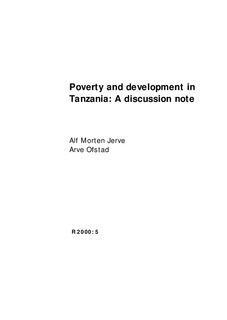| dc.contributor.author | Jerve, Alf Morten | |
| dc.contributor.author | Ofstad, Arve | |
| dc.date.accessioned | 2008-02-28T08:41:06Z | |
| dc.date.accessioned | 2017-03-29T09:12:55Z | |
| dc.date.available | 2008-02-28T08:41:06Z | |
| dc.date.available | 2017-03-29T09:12:55Z | |
| dc.date.issued | 2000 | |
| dc.identifier.isbn | 82-90584-68-7 | |
| dc.identifier.issn | 0805-505X | |
| dc.identifier.uri | http://hdl.handle.net/11250/2435972 | |
| dc.description.abstract | This brief discussion note is focusing on major policy issues confronting Tanzania when aiming at a substantial reduction in poverty level over the next decades. The government has high ambitions for creating high quality livelihoods and eradication of extreme poverty by year 2025, within a liberal growth-oriented development framework. The starting point is most challenging with widespread poverty and a relatively weak state highly dependent on international donors. It is therefore not realistic that Tanzania will achieve the International Development Target in reducing the poverty level.
The paper proposes to analyse five dimensions of policies for poverty reduction. The government will have to make a number of policy choices and trade-offs when attempting to combine economic opportunities with protection of safeguards and minimum rights. The paper reveals many uncertainties about the level and trends in poverty, and a stronger effort should be made to improve data and analysis.
Most important is to generate a better understanding of the causes and social dynamics of poverty, and to monitor the effects of various policy initiatives. | |
| dc.language.iso | eng | |
| dc.publisher | Chr. Michelsen Institute | |
| dc.relation.ispartofseries | Research report | |
| dc.relation.ispartofseries | R 2000: 5 | |
| dc.subject | Poverty reduction | |
| dc.subject | Government policy | |
| dc.subject | Tanzania | |
| dc.title | Poverty and development in Tanzania: A discussion note | |
| dc.type | Research report | |
